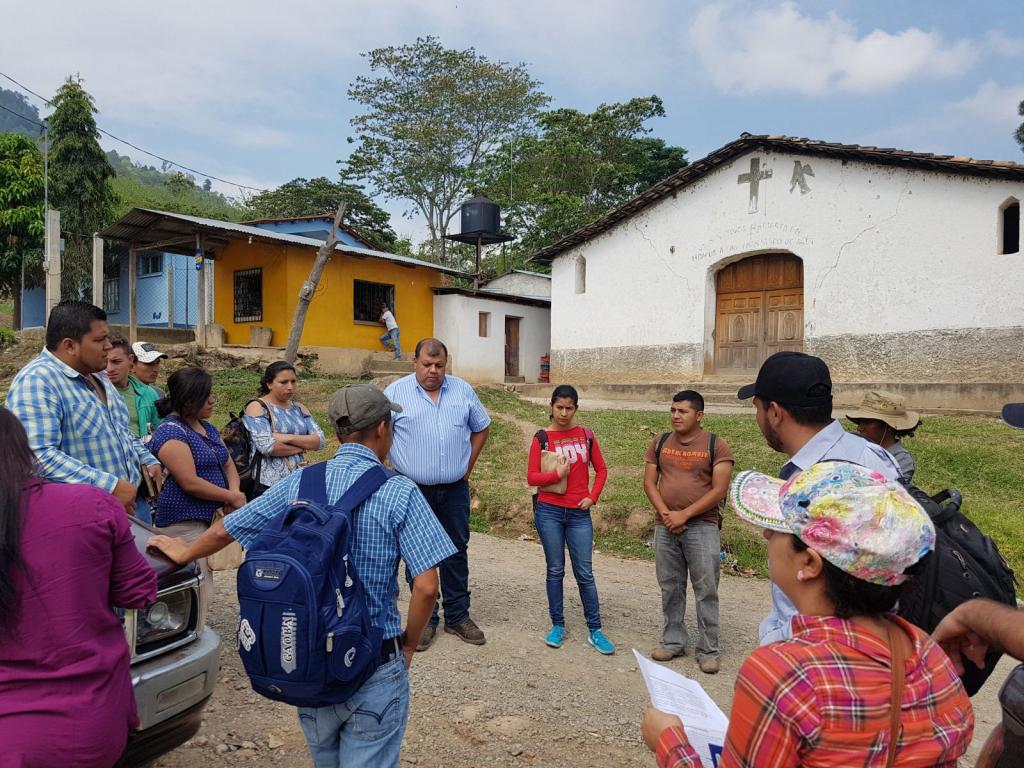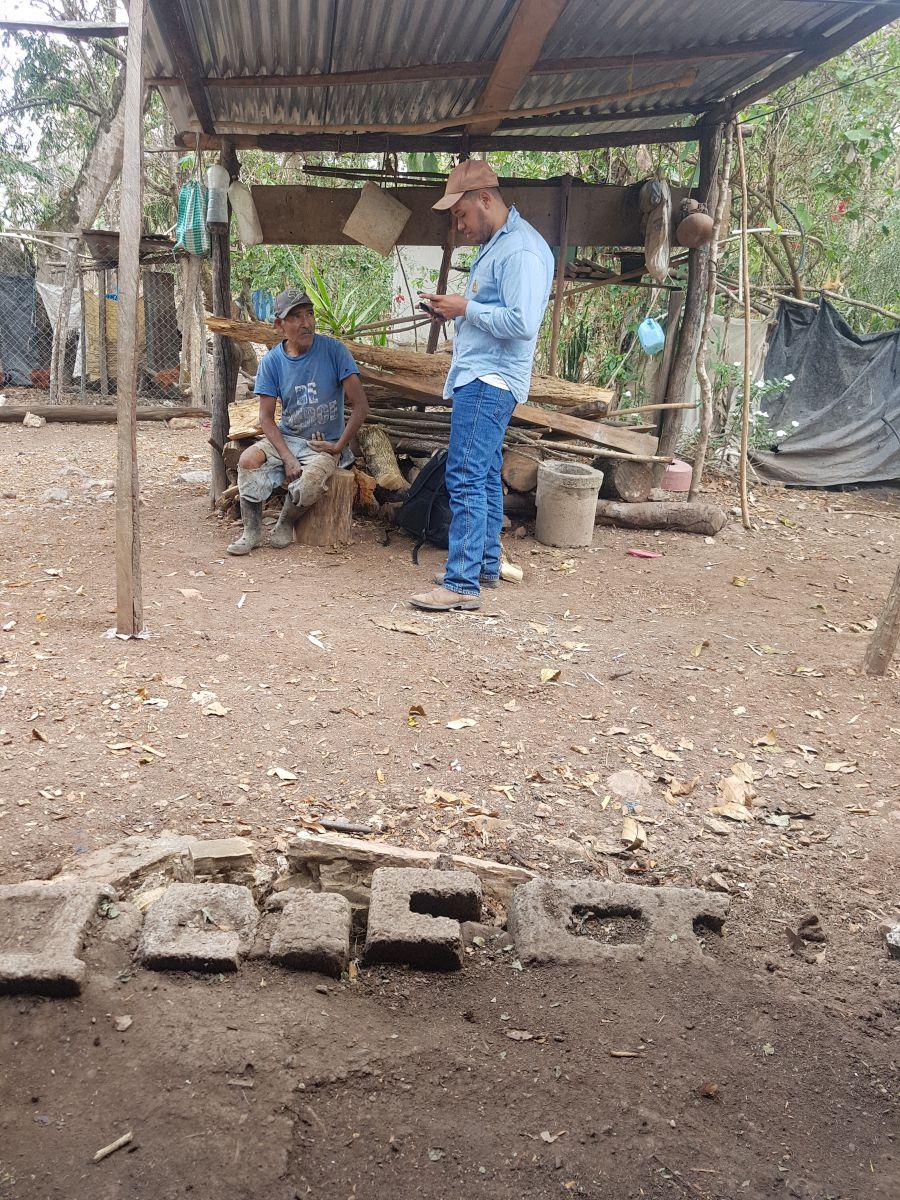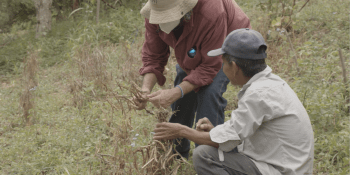Monitoring climate-smart agriculture practices with Geofarmer in Guatemala and Honduras

Geofarmer is an application that facilitates the collection of information and can also reduce costs and time in the field.
In April 2018, within the framework of the development of Climate-Smart Villages (CSVs) in Olopa (Guatemala) and Santa Rita (Honduras), the partnership between the Tropical Agronomic Center for Research and Teaching (CATIE) and the CGIAR Research Program on Climate Change, Agriculture and Food Security (CCAFS), with the support of the International Development Research Center (IDRC), enabled monitoring of Sustainable Climate Adapted Agriculture (ASAC) practices using the Geofarmer application.
Geofarmer is an application that "facilitates the recollection of information in a participatory and interactive way in the community based on structured and transparent communication between groups of experts, as producers, extension agents and scientific researchers." The tool can also reduce costs and time in the gathering of information in the field, while enabling the evaluation of adoption of adaptation practices by families.
Monitoring was carried out in the following territories:
- Communities in CSV Olopa (Guatemala): Prensa Centro, Prensa Arriba, Nochan, El Guayabo, Tituque, Tuticopote y Valle Nuevo
- Communities in CSV Santa Rita de Copan (Honduras): Rastrojitos, Tierra Fría 1, Vado Ancho, La Quesera, El Mirador, La Arada y Aldea Nueva
Why monitor?
It is expected that the monitoring in the CSVs on an annual basis will provide useful information for planning new cycles of implementation. The objectives for the monitoring include:
- To identify the climate-smart agriculture (CSA) practices promoted in CSV Olopa and CSV Santa Rita to reduce the impacts of climate change.
- To understand the factors that facilitate or limit the implementation/adoption of priority CSA practices to improve the adaptation of agricultural systems to climate change.
- To generate quantitative evidence on the effects of the practices promoted by the CATIE-CCAFS alliance in CSVs.

Field practice with facilitators at the Prensa Centro, Olopa, Guatemala. Photo: Walter Aristondo (CATIE)
Training local facilitators
From April 3rd to 6th of 2018, in the small town of Esquipulas in Guatemala, CCAFS researchers trained 14 local facilitators (seven from Guatemala and seven from Honduras) in the use of the Geofarmer application to monitor CSA practices. The training included a day of fieldwork with the Prensa Centro communities in the municipality of Olopa in Guatemala and Tierra Fría in Santa Rita de Copan in Honduras, which allowed local facilitators to familiarize themselves with the application.
Later, from April 6th to 29th, the facilitators visited 284 homes. Fredy Vásquez, a local facilitator of CSV Olopa, explained, "we are making a comparison with families interviewed during the baseline study in 2014 to see what changes have occurred with respect to the activities that people are doing to adapt to the climate. If people, through their own means, have undetaken some agricultural activity or steps to protect their livelihoods by adapting to the climate, then, that is what we want to know."

Use of Geofarmer, Olopa, Guatemala. Photo: Walter Aristondo (CATIE)
In CSV Olopa, 143 households were interviewed: 106 interviews were with the head of household together with his spouse or partner, and 37 interviews were with one person only (for individuals that were single, divorced, or whose companion had passed away).
In CSV Santa Rita de Copan, 141 households interviews were conducted, including 119 interviews with the head of household and his spouse or partner, and 22 interviews with one person only.
Calculating the effect of CSA practices on the farm
With the families that have promoted and implemented CSA practices (26 CSV Olopa families and 18 Santa Rita TeSAC families), the Geofarmer application was used to collect information through the “CSA calculator” module, a tool developed by the International Center for Tropical Agriculture (CIAT), which allows users to evaluate the effect of these practices on producers' farms, taking into account the three pillars of CSA: productivity, mitigation and adaptation.
Based on an analysis of the information collected, the CATIE-CCAFS alliance will be able to guide its actions more effectively so that producer families can face the effects of climatic variability in these territories with greater capacity.
Read more:
José Gabriel Suchini is the Territorial Technical Coordinator and Coordinator for CATIE in Trifinio. Walter Aristondo is the Field Supervisor for CATIE in Trifinio. Liliana Patricia Paz is a Guest Researcher at the Universidad del Cauca, Colombia.



